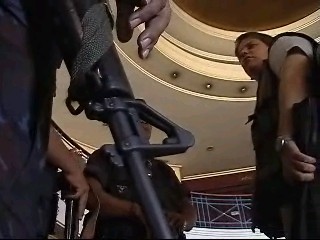powered by ODEO
Friday, April 28, 2006
New US CT status report
New counter-terrorism progress report out
New report released on counter-terrorism efforts of the
• “In the Philippines, authorities have regained control of the island of Basilan and, increasingly, the island of Jolo, both areas of operation for Abu Sayaff and Jemiah Islamiya.”
I am kind of questioning the lead sentence of the press release- which seems to say the
link to the report is below as well.
Mike-
======================================================
U.S.
Country Reports on Terrorism 2005 finds terror groups smaller, more sophisticated
By David I. McKeeby
An annual report developed jointly by the State Department and the
Among the broader trends identified in the report, Crumpton said that terrorist groups are forming smaller, harder-to-detect cells; becoming more technologically sophisticated, particularly in their use of the Internet; and are building closer links with international criminal networks. He also said many terrorist groups continue to focus their efforts in
FORCE BUYS TIME, SPACE TO DEFEAT TERRORISM
Military force alone cannot defeat terrorism, Crumpton said. “We must fight the enemy with precise, calibrated force to buy space and time to transform the environment and the conditions which terrorists exploit.”
He said the report emphasizes the need for a multilevel strategy “utilizing all the instruments of statecraft” to counter violent extremism and disrupt terrorist networks globally; using regional partnerships to deny terrorists safe haven; and improving security by using development assistance programs to help countries build institutions that support the rule of law and address political and economic injustices.
“This is not just the right thing to do; it also enhances our partners' capacity to resist the terrorist threat and address conditions that terrorists exploit,” Crumpton said.
The report finds that al-Qaida’s core leadership no longer has effective global command and control of its networks, Crumpton said. Confined to an increasingly smaller territory along the Afghanistan-Pakistan border, Crumpton says that al-Qaida’s senior leaders increasingly are frustrated by their lack of control and “desperate to claim Iraq as their own,” resorting to propaganda to demonstrate their continuing influence by inspiring terrorist attacks.
“Al-Qaida and its affiliates are attacking what they fear the most, the development of a global civic society -- a society characterized by global networks of liberal institutions, free speech, democratic organizations, free-market forces, and law,” Crumpton said.
Although international cooperation has succeeded in denying them safe haven in
PROGRESS AND CHALLENGES
Crumpton said that the report features regional overviews and reports on the terrorist situation in individual countries, marking not only the progress made but also the challenges remaining.
Among the examples of success he cited:
• In
• In the
• In
• In
The report also identifies several countries that the
Iran’s ongoing vocal support of terrorist attacks against other countries, combined with its failure to disclose the true extent of its nuclear program to the international community also raise the continuing concern that it may facilitate future terrorist attacks utilizing weapons of mass destruction, Crumpton said.
The full text of the new report is available on the State Department Web site.
For more information, see Response to Terrorism.

